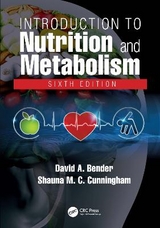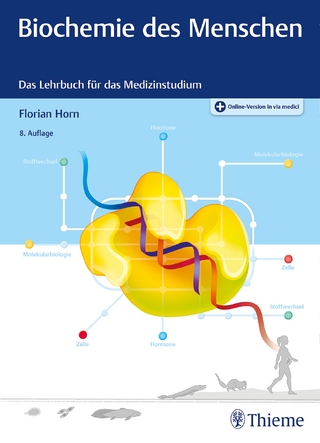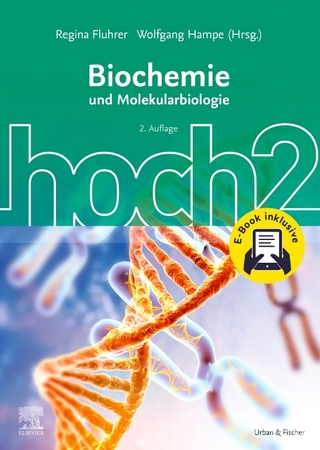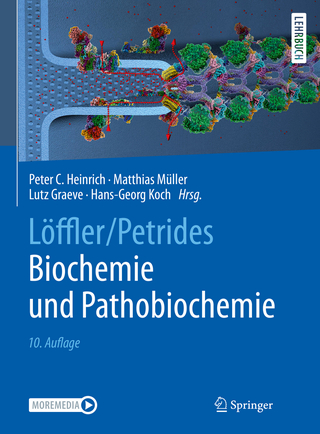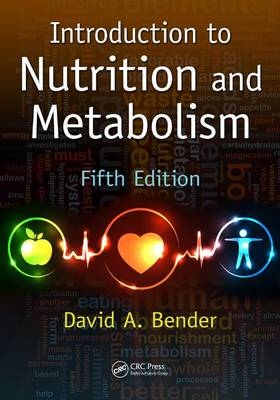
Introduction to Nutrition and Metabolism
Crc Press Inc (Verlag)
978-1-4665-7224-9 (ISBN)
- Titel erscheint in neuer Auflage
- Artikel merken
This full-color text explores the need for food and the uses to which that food is put in the body, as well as the interactions between health and diet. It describes the metabolic pathways and the biochemical basis of their nutritional and physiological importance. Topics covered include chemical reactions and catalysis by enzymes; the role of ATP; digestion and absorption of carbohydrates, fats, and proteins; issues associated with being overweight; problems of malnutrition; and vitamin and mineral requirements and functions.
This new edition contains significantly expanded information on a variety of subjects including appetite control, hormone action, and integration and control of metabolism. The fifth edition also includes a list of key points at the end of each chapter.
This text explains the conclusions of the experts who have deliberated on nutritional requirements, diet, and health, as well as the scientific basis for the conclusions they have reached. It also provides a foundation of scientific knowledge for the interpretation and evaluation of future advances in nutrition and health sciences. The accompanying CD-ROM contains new interactive tutorial exercises, PowerPoint presentations for each chapter, self-assessment quizzes, simulations of laboratory experiments, and a nutrient analysis program.
David A. Bender received his PhD from the University of London on the metabolism of aromatic amino acids. He retired from University College London (UCL) in 2011, with the title of emeritus professor, and continues to give a number of lectures on nutrition to medical and science students, both at UCL and at the University of Surrey. From 1994 until retirement, he was assistant faculty tutor to the medical students, and from 1998 he was subdean (education) and director of studies for the early years of the medical course at UCL. His research interests have been in the field of amino acid and vitamin nutritional biochemistry, and he was a member of the working group on vitamins that formed part of the expert committee that produced the 1991 report on Dietary Reference Values for Food Energy and Nutrients for the United Kingdom, the EU expert committee that produced the 1993 report on Nutrient and Energy Intakes for the European Community, and the Food Safety Authority of Ireland working party on Safe Micronutrient Levels.
Why Eat?
The need for water
The need for energy
Metabolic fuels
Hunger and appetite
Enzymes and Metabolic Pathways
Chemical reactions: breaking and making covalent bonds
Enzymes
Factors affecting enzyme activity
Coenzymes and prosthetic groups
The classification and naming of enzymes
Metabolic pathways
Enzymes in clinical chemistry and medicine
The Role of ATP in Metabolism
The adenine nucleotides
Functions of ATP
The phosphorylation of ADP to ATP
Digestion and Absorption
The gastrointestinal tract
Digestion and absorption of carbohydrates
Digestion and absorption of fats
Digestion and absorption of proteins
The absorption of vitamins and minerals
Energy Nutrition: the Metabolism of Carbohydrates and Fats
Estimation of energy expenditure
Energy balance and changes in body weight
Metabolic fuels in the fed and fasting states
Energy-yielding metabolism
The metabolism of fats
Tissue reserves of metabolic fuels
Gluconeogenesis—the synthesis of glucose from non-carbohydrate precursors
Diet and Health: Nutrition and Chronic Non-Communicable Diseases
Chronic non-communicable diseases (the ‘diseases of affluence’)
Types of evidence linking diet and chronic diseases
Guidelines for a prudent diet
Nutritional genomics: interactions between diet and genes
Free radicals, oxidative damage, and antioxidant nutrients
Homocysteine in cardiovascular disease
Other potentially protective compounds in foods
Overweight and Obesity
Desirable body weight
The problems of overweight and obesity
The causes and treatment of obesity
Protein-Energy Malnutrition: Problems of Undernutrition
Problems of deficiency
Protein-energy malnutrition
Marasmus
Cachexia
Kwashiorkor
Protein Nutrition and Metabolism
Nitrogen balance and protein requirements
Protein synthesis
The metabolism of amino acids
The Integration and Control of Metabolism
Patterns of metabolic regulation
Intracellular regulation of enzyme activity
Responses to fast-acting hormones by covalent modification of enzyme proteins
Slow-acting hormones: changes in enzyme synthesis
Hormonal control in the fed and fasting states
Selection of fuel for muscle activity
Diabetes mellitus—a failure of regulation of blood glucose concentration
Micronutrients: the Vitamins and Minerals
The determination of requirements and reference intakes
Vitamin A
Vitamin D
Vitamin E
Vitamin K
Vitamin B1 (thiamin)
Vitamin B2 (riboflavin)
Niacin
Vitamin B6
Vitamin B12
Folic acid
Biotin
Pantothenic acid
Vitamin C (ascorbic acid)
Minerals
Nutritional anaemias
| Erscheint lt. Verlag | 25.4.2014 |
|---|---|
| Zusatzinfo | 850 NEW CDS ORDERED 3/18/09 FROM; 84 Tables, black and white; 218 Illustrations, color |
| Verlagsort | Bosa Roca |
| Sprache | englisch |
| Maße | 178 x 254 mm |
| Gewicht | 975 g |
| Themenwelt | Medizin / Pharmazie ► Gesundheitsfachberufe ► Diätassistenz / Ernährungsberatung |
| Studium ► 1. Studienabschnitt (Vorklinik) ► Biochemie / Molekularbiologie | |
| Naturwissenschaften ► Biologie ► Biochemie | |
| ISBN-10 | 1-4665-7224-8 / 1466572248 |
| ISBN-13 | 978-1-4665-7224-9 / 9781466572249 |
| Zustand | Neuware |
| Informationen gemäß Produktsicherheitsverordnung (GPSR) | |
| Haben Sie eine Frage zum Produkt? |
aus dem Bereich
